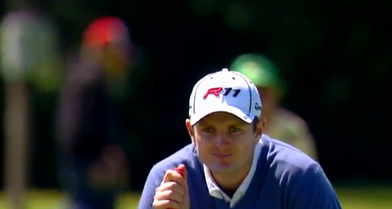 Each year on the men’s and women’s golf tours in all parts of the world the competitive scoring average is lowering as more ambitious and highly skilled golfers join the tour in their quest to become the next big thing in golf. Like many, we closely follow the professional men’s and women’s golf tours both at local level as well as all the major international ones. At local level we know many of the professional golfers playing the tournament circuit and we get excited when they are in contention in tournaments and we sympathize with them when they’re not playing their best. 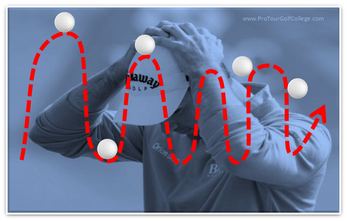 Playing professional golf tournaments is a lot like riding a roller-coaster. You have the high scores and you have the low scores. Playing amateur or professional golf tournaments competitively requires an ability to ride these normal highs and lows and above all else, find a way to keep producing competitive golf scores. This is by far the most important skill to develop. Therefore every golf skill that you practice should in all likelihood lead you to a lower golf score average and push you towards becoming one of the best golfers on your golf tour. The challenge with this is that it’s not easy to accomplish because for many golfers practicing to improve is more of a lottery than a science. Golfers will try all sorts of approaches to improve their golf skills and sadly quite often they’re a long way from practicing so they improve. In our experience we have found that there are a number of practice habits that we believe hold advanced and elite golfers back from making progress. We call these the 7 Deadly Golf Practice Sins and these habits will hold you back from playing the best golf of your life. See if you have any of the following deadly practice sins in your game. 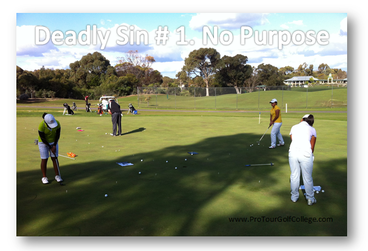 Hitting Golf Balls Without a Clearly Defined Purpose The easiest thing to do is perform a task without thinking too much about it. When skills get to an automatic level (like driving a car) very little conscious thought is involved in the process. This is a good thing for the many tasks we perform every day, but when it comes to practicing golf shots this is the last thing you want to do. It is surprising how many advanced golfers hit balls without thinking a lot about their major definite purpose. Your major definite purpose is your ultimate reason for applying effort every time you practice golf. It defines the reason WHY you are there and is connected to your longer term goals. When you practice be very clear how the practice you’re performing will change some aspect of your performance in the future. Don’t just ‘hit balls,’ prepare, plan and perfect your golf skills practice to drive your scores down. 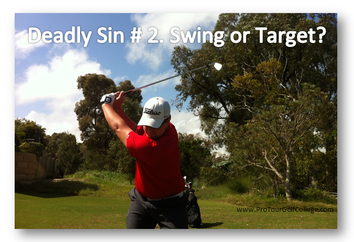 Working On Your Golf Swing Technique Whilst Trying to Perfect Shots to a Target You hear a lot of talk about the research on multi-tasking and here’s what it says. When human being try to focus on performing two or more tasks at the same time they fail! Your conscious mind is incredibly clever at helping you to perform one skill expertly or manage one challenge at a time, but when you ramp it up to two or more tasks you will fail. Hitting golf shots whilst you try to perfect your golf swing technique is one of the most common multi-tasking errors performed by golfers. It might seem logical to hit shots to a target and at the same time make sure that your X equals your Y but you’re just asking for trouble. Separate the two; if you’re working on your technique take the target out of the equation. If you’re working on your targeting take the technique thinking out of the equation. You might think that performing both these tasks at the same time is saving you time, it doesn’t it actually increases the overall time it take to learn and habituate the skill. 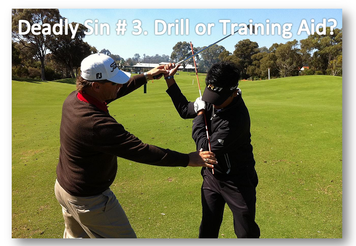 Practicing a Drill or Using a Training Aid Because Someone Else is What is the purpose of a practice drill? The purpose of a practice drill is to reinforce a correct feel sensation repeatedly until you turn it into a habit. The drill type should be relevant to your particular needs-not someone else’s. What is the purpose of a training aid? The purpose of a training aid like a practice drill is to reinforce a particular feel to habituate it. Many advanced and elite golfers copy the drill routines and use training aids of another golfer (like a successful tour professional) which makes no sense as every golf swing is as different as every fingerprint is – no two are the same. You need your golf instructor to design a highly specific practice drill with or without a training aid for you to reinforce an ideal behavior rather than copying the drill of the month straight out of the latest golf magazine.  Overdosing on Video Analysis Video as a tool to help a golfer to understand a particular swing flaw or in-fact a swing goal is a very useful tool. But that is just it; it is a tool - not a crutch. With video cameras now in every mobile phone and apps that allow the golfer to dissect the swing into parts, we are seeing a new emerging problem in young golfers who are becoming addicted (can’t stop) to perfection of their golf swing technique via a video. Golfers are spending more time looking at their swing than actually working on it and developing the necessary feels required to compete with. Video should be used carefully and ideally with professional assistance to interpret results correctly. Video helps you to understand your goals but practice turns it into a reliable feel. You should spend more time developing the correct feel and less time analyzing your swing positions.  Spending Too Much Time Texting or on Facebook and Twitter Rather Than Practicing Your Golf Skills Do yourself a favor and turn your mobile phone off when you go to practice. This is particularly true of golfers aged between 15 and 25 who spend a great deal of time checking Facebook and twitter instead of putting in the hours of practice required to become a champion golfer. We have witnessed this occurrence continually on the practice ground where golfers get lost in cyber-world and lose track of time. Over the past few years and it seems to be getting worse. Mobile phones are a huge distraction and will significantly influence your practice flow and work output and ultimately for many, they will stop you from becoming the golfer you’re trying to become. It might seem like a trivial thing, but it isn't. Practicing requires a commitment to focus and you develop this through consistent effort and intent without distraction.  Listening to Music Whilst You Try to Practice Your Golf Skills This deadly sin has been around for a long time and seems harmless enough until you understand what is actually going on. Listening to songs on your iPod whilst you practicing to perfect golf skills again doesn't make a lot of sense. This deadly sin is one of the biggest ones and there’s no doubt that many reading this won’t agree with us but we need to share the message to those who are really serious about improving their game. The constant theme with our deadly practice sins is distraction and distraction erodes ability and many of the compact instruments that do this were never designed for elite performers. They were designed for the general public. Your brain is an incredibly marvelous system that above all else has as its number one goal to prioritize information it receives through your senses (ears, nose eyes…). When you practice golf skills and you’re concentrating on executing golf shots with precision whilst at the same time listening to music from your iPod vibrating on your ear drums makes it extremely challenging for your brain to prioritize the information it receives. You need to decide what your priority is; do you want to listen to music? Or do you want to execute golf strokes with precision, because you cannot do both really well. 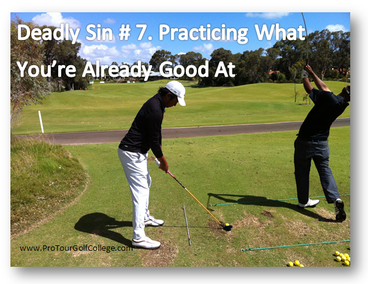 Practicing Skills You’re Good At and Ignoring Ones You’re Not Good At This is an old chestnut but a good one, practicing skills that you’re already good at. At Pro Tour Golf College we spend a lot of time observing golfers practicing. Not just the students in our tour bridging program but those that practice at our facility, and when you spend enough time doing this the one constant is that a lot of advanced golfers perform the same routines over and over with the same clubs to the same holes. It’s what we call ‘mindless practice’ where you perform your routines and go home satisfied in the knowledge that you have accomplished the goal of practicing things that you are good at. What you want to do is ‘mindful practice’ where you pre-plan your practice and decide on the weakest-most-important skills that will enhance your performances on the golf course. Then you design your practice routines to work on the weaker skills that aren't fun to practice (because you are not good at them) but that will help you to play a lot better. So there you have it. Our 7 Deadly Practice Sins that we have found will severely affect your future success if your desire is to become a top ranked amateur or professional golfer. You might not agree with our list of sins, but it is hard to argue that practicing these habits will be beneficial to your ongoing development as a golfer. We hope you enjoyed the article and if you have any suggestions on habits that you believe also affect golfers performances that we haven't mention please let us know. Lawrie Montague and David Milne - Pro Tour Golf College Your Success On Tour is Our Business
Andrew
4/3/2013 08:24:17 am
#2 Swing or Target is a really good one that really clarified the meaning for me. I pick out a target but now I realise I am still thinking about technique as I swing. It is something I need to be aware of while practising. 4/3/2013 09:55:30 am
Ideally you would be aware of the type of shot you wish to hit as a swing feeling or image depending on your primary modality. The trouble is that for many golfers they are aware of the target but place more importance of moving their swing a certain way moving their focus from shot-making to swing-making. Comments are closed.
|
Archives
June 2019
|
Proudly Supported By
Copyright © 2011 - 2018 Pro Tour Golf College
Website Managed By Golf Performance Media
All Rights Reserved
Website Managed By Golf Performance Media
All Rights Reserved

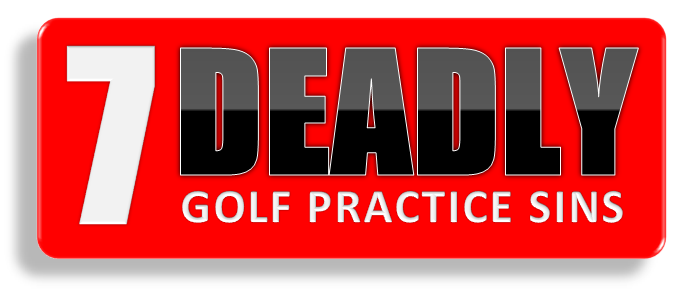
 RSS Feed
RSS Feed



